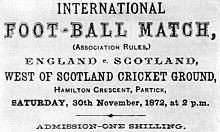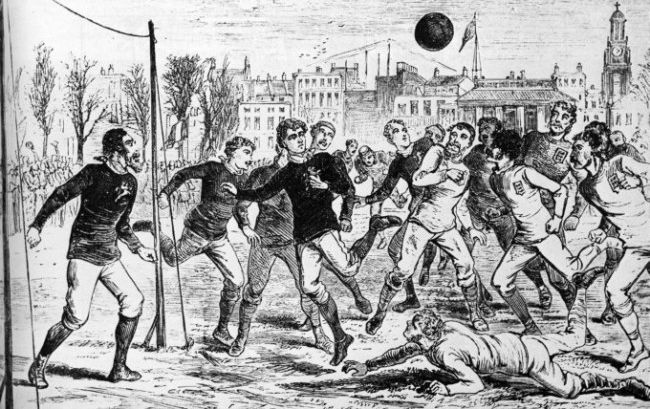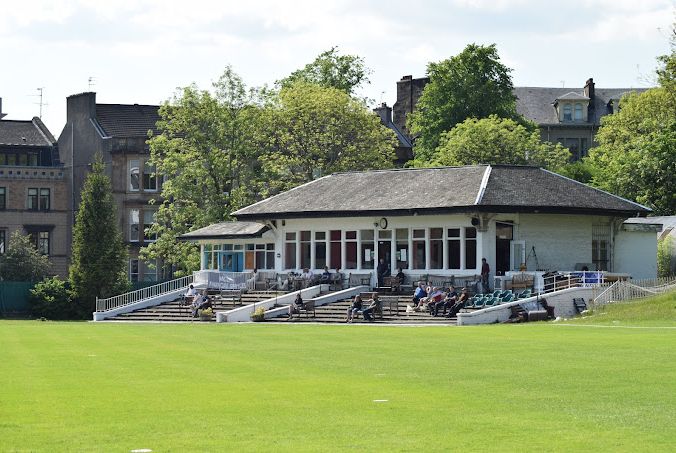1872 - The First International
(West of Scotland Cricket Ground)

Encouraged by interest raised, particularly in Scotland, by the participation of Queen's Park in the March 1872 semi-final of the first FA Cup something of what we might today call a "re-branding" took place. Whilst there had been England versus Scotland matches played, five in all, they had been in London and between teams that were at best quasi-national. But this time it was to be different. It would be held in Glasgow, even if the perhaps modern convention of home-team first and aawy-team second was reversed. Moreover, finally Scots would play for the home side and Englishmen for the visitors instead of the United Nations that had been the precedent.
Furthermore, the Scots were able to choose the time and date. Significantly the latter would be 30th November, aka St. Andrew's Day and the former 2pm so the teams did not end up playing in the dark. And they could select the ground, their captain and goalie, Robert Gardner, making the interesting but canny choice not of the long Academicals' rugby ground, which could be had at no cost, but the shorter, squarer area in Partick of the West of Scotland Cricket on Hamilton Crescent, now Fortrose St., for which a fee was due. It may not sound very Scottish, and certainly not Aberdonian, but his family was from Paisley and he had his reasons.
The cricket ground is still there and not large, Indeed, on the day it was smaller still, hemmed in by a good crowd of perhaps 4000. And when the teams took the field it was clear that previous reports that the English team was heavier, in what was then very much a contact sport, were true wit ever likelihood that, as also reported, they were faster too. Bu there was a second surprise. When the Scots took lined up for the start they did not do so conventionally - a 1-2-7 or a 2-1-7, rugby-style - but with a goalkeeper, two full-backs side-by-side and six forwards with two half-backs in-between.

Thus it was on that November day defence came to the Association game. It took the form of a box and there was more. It had been drilled, presumably by Gardner. Whilst it was hardly the passing-game as we know it, it was both "scientific" and "combination", the four, directed from behind contracting under pressure, expanding in attack and interacting in contrast to the Englishmen's individualism. The result from reports was an exciting spectacle with the "Saxon" physical advantage nullified, no goals but the crowd by all accounts going away still more enthused by a game, of which this would have been the first live viewing. Equally the Press reports were positive and matters were soon in hand for a return, in fact much anticipated returns to this day.
So what is the significance, the whole significance of the St. Andrew's Day, 1872 match. For one official, international football was born but more importantly association football was probably saved from extinction. Within months Queen's Park, the doyen of Scottish clubs, which had essentially provided the Scotland team went within a year from having no opposition to being a founding member of the Scottish Football Association, within two years to winning the first Scottish Cup, with five of the game spreading across the Lowlands and within ten to most of the country and abroad. Within that same timeframe the English game was remarkably boosted too. Moreover, the more defensive style of play employed by Scotland that day was adopted and then adapted far and wide as its national team became virtually unbeatable and it remained the foundation, to which mid-field would be added and on which modern football is grounded. It might even be argued that a team both doctored the pitch and shut up shop for the first time.

Which leaves one final point. Since association football is the World's game, when will the West of Scotland Cricket Ground, which remarkably has survived the twin ravages of planning and development and before it is too late, be designated a National or even World Heritage site? Rio de Janeiro's Maracana is the former not for its architectural but its Brazilian cultural significance. Are we not dealing with at least equivalence?